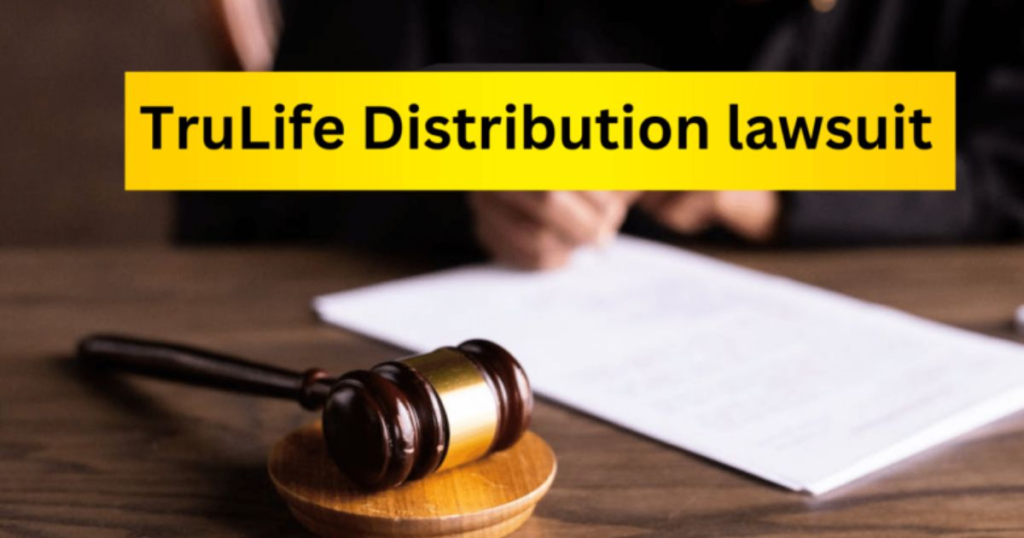In the rapidly evolving business world, the Trulife Distribution lawsuit stands out as a significant legal battle that has captured the attention of industry insiders and legal professionals alike. This landmark case, emerging in early 2024, has far-reaching implications for distribution practices, contract law, and corporate accountability. As we delve into the intricacies of this lawsuit, it becomes clear that the outcome could set a precedent for future disputes in the distribution sector and beyond.

Introduction to the Trulife Distribution Lawsuit
The Trulife Distribution lawsuit originated from a complex dispute between Trulife Distribution, a leading health and wellness sector distributor, and one of its primary suppliers. The crux of the lawsuit revolves around alleged breaches of contract, unfair distribution practices, and accusations of trade secret misappropriation. The legal battle has drawn significant attention for the high stakes involved and the legal precedents it might set.
The Legal Framework and Allegations
Central to understanding the Trulife Distribution lawsuit is grasping the legal framework underpinning the case. The lawsuit encompasses several critical legal issues, including breach of contract, where one party alleges that the other failed to fulfill their contractual obligations. Additionally, the case touches on antitrust considerations, given the implications of distribution practices on market competition. The allegations of trade secret misappropriation highlight the importance of intellectual property rights in highly competitive industries.
Impact on Industry Practices
The Trulife Distribution lawsuit is more than a legal battle; it reflects broader trends and practices within the distribution and supply chain sectors. The case highlights the delicate balance between competitive strategies and ethical business practices. As the lawsuit progresses, it may prompt companies to reevaluate their contracts, distribution agreements, and compliance with trade regulations. The outcome could influence how companies manage distribution networks, protect intellectual property, and engage with competitors.
Legal Precedents and Future Implications
One of the most intriguing aspects of the Trulife Distribution lawsuit is its potential to set legal precedents. Depending on the rulings made, the case could influence how future disputes over contracts, distribution practices, and intellectual property are resolved. Legal professionals and corporate leaders closely watch the case, anticipating how its outcomes might impact legislative frameworks and business operations. The lawsuit serves as a reminder of the evolving nature of business law and the need for companies to navigate legal landscapes carefully.

Analyzing the Defense and Prosecution Strategies
The strategies employed by both the defense and the prosecution in the Trulife Distribution lawsuit offer fascinating insights into the complexities of business litigation. The defense, representing Trulife Distribution, argues that their actions complied with existing contracts and laws, emphasizing the competitive nature of the industry. On the other hand, the prosecution presents a narrative of unfair practices and contractual breaches, aiming to highlight the defendant’s alleged disregard for legal and ethical standards. The contrasting strategies underscore the multifaceted nature of legal disputes in business.
Looking Ahead: The Broader Impact of the Lawsuit
As the Trulife Distribution lawsuit unfolds, its broader impact on the industry, legal practice, and corporate governance becomes increasingly apparent. The case is a litmus test for the enforcement of contractual agreements, the protection of trade secrets, and the regulation of distribution practices. Beyond the immediate legal outcomes, the lawsuit may lead to more rigorous scrutiny of business practices, enhanced transparency, and a renewed emphasis on ethical business conduct.
The Role of Digital Evidence in the Lawsuit
In the digital age, the nature of evidence in legal disputes has evolved, and the Trulife Distribution lawsuit is no exception. Digital communications, transaction records, and even social media posts have become crucial in piecing together the events leading up to the lawsuit. This shift towards digital evidence presents both opportunities and challenges for legal professionals. It requires sophisticated techniques to collect, preserve, and analyze digital data while ensuring the evidence remains admissible and relevant in court. In this case, the reliance on digital evidence underscores the growing intersection between technology and law, highlighting the need for legal systems to adapt to the digital era.
Ethical Considerations and Corporate Responsibility
The lawsuit also highlights ethical considerations and corporate responsibility within the business landscape. It raises questions about the extent to which companies should pursue competitive advantage and the ethical boundaries of business strategies. The discussion extends beyond legal compliance to ethical conduct as the legal proceedings uncover the details of Trulife Distribution’s practices. This aspect of the lawsuit encourages businesses to reflect on their practices, considering the legality and morality of their actions in an increasingly scrutinized corporate world.

Public Perception and Stakeholder Impact
Public perception plays a significant role in shaping the narrative around high-profile lawsuits like that of Trulife Distribution. The court of public opinion often delivers its verdict long before the legal process concludes, affecting stakeholder confidence and market position. This lawsuit has sparked debates on social media, industry forums, and among the general public, influencing how customers, investors, and partners view Trulife Distribution and its counterparts. The case’s eventual outcome may have lasting effects on brand reputation, investor relations, and customer trust, highlighting the importance of managing public relations alongside legal strategies.
Global Implications and International Law
While the Trulife Distribution lawsuit may be rooted in specific legal jurisdictions, its implications extend across borders, touching on aspects of international law and global business practices. The global supply chain and international partnerships bring to light the complexities of navigating legal standards and business ethics in a globalized economy. This aspect of the lawsuit underscores the need for multinational corporations to understand and comply with the laws of the countries in which they operate and international regulations and norms. The global reach of the case demonstrates the interconnected nature of modern business and the importance of international legal frameworks in resolving cross-border disputes.

Conclusion: Navigating Uncharted Waters
The Trulife Distribution lawsuit is more than a legal dispute; it reflects the evolving challenges and complexities of the modern business and legal landscape. As companies navigate these uncharted waters, the outcomes of such lawsuits serve as beacons, guiding the way toward more ethical, responsible, and legally compliant business practices. The lawsuit underscores the importance of digital evidence, raises ethical questions about corporate conduct, affects public perception and stakeholder confidence, and highlights the global implications of business decisions.


